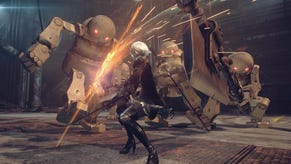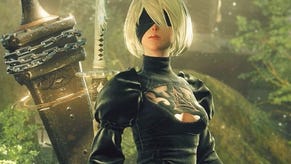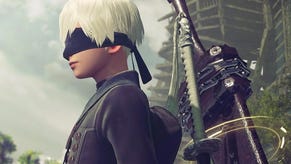Nier
And yet so far.
One of the ongoing stories of this current console generation is Japanese publishers attempting to tailor their games to the ever-expanding western market in search of the sales needed to stay profitable. In Japan, Nier comes in two varieties: the PS3's Replicant features a more youthful, slimline avatar, while the Xbox 360's Gestalt is identical to the single and suffix-free western version. This time, it seems we're looking at a rare case of role-reversal, with the pre-existing older protagonist deemed to be an inappropriate match for eastern tastes.
The game's intro gives a clue to what Square Enix thinks English-speaking players like, as a female character yells a charming request: "Pull your head out of your goddamn ass and start f**king helping us." Throw in a grizzled, gruffly-voiced hero with a physique chiselled from the same rock as Conan, the buckets of blood spilled with every slice of his sword, and couple that with the combat-heavy early trailers, and you could be forgiven for expecting a Japanese take on God of War or a more focus-tested Bayonetta. And you couldn't be further from the truth.
Nier opens in a frozen, post-apocalyptic world, as an unnamed, grey-haired dad picks up a piece of debris to fend off the bizarre creatures threatening his daughter Yonah. It plays like an ultra-simplistic hack and slash, with seemingly endless waves of foes coming into being as our hero levels up every few swipes, unleashing powerful magic attacks alongside regular melee blows.
After a short cut-scene, we're rudely shunted forward over 1000 years, as a suspiciously similar-looking man tends to his identically-monikered daughter in a pastoral village hub straight out of the JRPG handbook. A few laborious fetch-quests and a couple of large enemies later, and it appears we're in Monster Hunter territory for a while, until the game eventually settles into a rhythm of puzzle and combat-led dungeons and myriad minor side-quests that for the most part feels very Zelda.
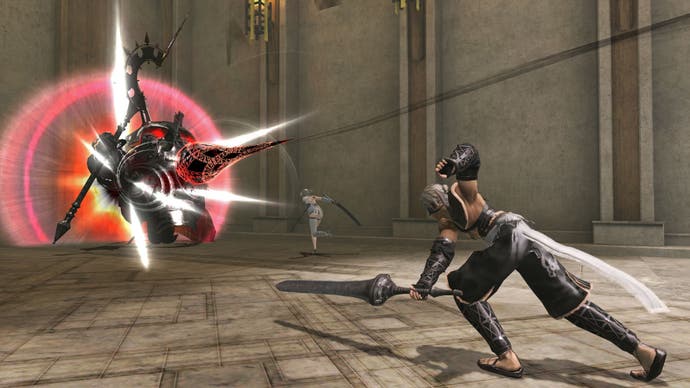
This genre-hopping opening is a disjointed start to a game that you soon realise is rather deliberately playing with expectations. Early trailers suggested that nothing is as it seems in developer Cavia's decidedly mad world, and from the start onwards, Nier's mechanics do their very best to live up to the mysterious story. By two-thirds of the way through this twisted tale, you'll have experienced a bullet-hell boss, a rail-shooter sequence in a mine cart, and a fixed-camera exploration of a creepy, monochromatic mansion that screams Resident Evil.
Occasionally, you'll be yomping through a dungeon and the view will change to a top-down perspective, while a side-on 2D viewpoint is adopted when entering taverns or other town buildings. There seems to be little real significance to this, other than the developer changing things up because it can.
The gamble with attempting such a variety of gameplay types is that you risk mastery of none, and it's clear from the outset that Cavia's given itself too many balls to juggle. The opening sequence could well have players ejecting the disc before the game proper has even begun, the nameless hero hacking tirelessly at nondescript enemies as they continuously respawn for what seems like half an hour. Later, ill-advised moves into platforming territory fall hopelessly flat, partly thanks to one of the worst jumping animations you'll ever see. And though a few of the dungeons offer inventive puzzles, others lapse into block-pushing tedium, or introduce excessively punitive measures to extend the time spent solving them.
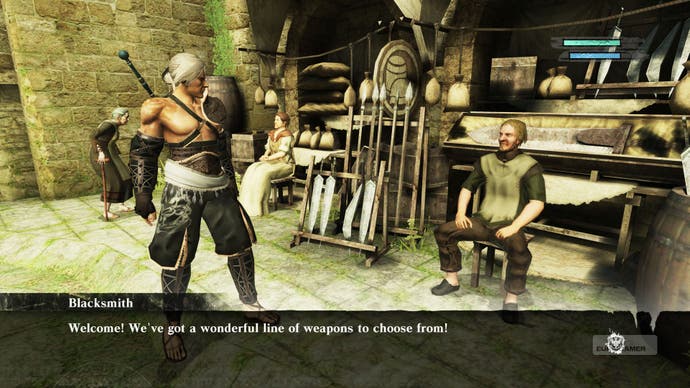
Everything takes just that little bit longer than it ought to, particularly the side-missions, many of which involve a ludicrous amount of to-ing and fro-ing to fulfil the simplest of requests. Often, it's easier to simply accept as many quests as possible and hope you stumble across the right person, item or ingredients as you tackle the main story. Rewards are frequently inadequate recompense for the effort taken, especially on occasions where a mere ‘quest complete' message is all you get.
Inconsistency is Nier's main problem, with aspects of both the action and RPG elements feeling either overstuffed or undernourished. In theory, you can tailor the combat to your own preferences by allocating either melee or magical moves to the bumpers and triggers, but in practice, there are a mere handful of abilities that are worth sticking with. Blocking is ineffective against the majority of foes, so that's immediately out of the window, while melee combat is so simplistic you'll revert to spellcasting to relieve the boredom. By the halfway point, you'll have unlocked more magical attacks than you can possibly use at any one time, and a couple of those are almost game-breakingly powerful.







